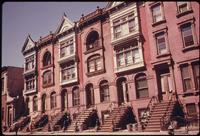In Another Brooklyn, Jacqueline Woodson explores the complex coming-of-age story of the teenage August, while seamlessly weaving in the history of the late 1960s and 1970s. She shows how events impacted the growth of individuals living in this time—like her fictional characters—but also how they touched the evolving landscapes of Brooklyn and the American nation.
Here are some of the historical happenings that provide the backdrop of August’s coming-of-age.
- August, the novel’s protagonist, was a part of the tail end of the Great Migration—which spanned roughly from 1910 to 1970. She moves from Sweet Grove, Tennessee to Brooklyn, New York in 1973 with her father and brother. An estimated 8 million African Americans left the rural South and moved to cities during this time. African Americans in the South suffered under Jim Crow Laws and had almost no opportunities to create financial independence; they moved to northern cities for better economic opportunities. The land August’s family owned was taken away by the government, leaving them with little in Sweet Grove, thereby stripping away any potential for success in the south.
- The Great Migration led to "white flight" in many northern urban neighborhoods, with wealthier whites moving from the city to the suburbs. August describes how "the last of the white people began fading" (p. 81) from her neighborhood. August’s changing neighborhood reflects the painful statistic that an average of three white people left for the suburbs for every black person who moved into the city between 1940 and 1970.
- August recounts her father and brother’s conversion to the Nation of Islam. With his newfound religion, her father brings home women like Sister Loretta, who "came by the way of the Honorable Elijah Muhammad, messenger of Allah" (p. 91). Under the leadership of Elijah Muhammad, the Nation of Islam strived to create economic independence and recover a clear identity for African Americans. This goal especially attracted black immigrants who recently moved from the south, like August and her family, due to financial and economic adversity.
- August recalls the Great Blackout of 1977, the power outage that occurred in New York City on July 13, 1977. She describes how "the lights went out in New York City and people looted stores on Broadway then rode through [her] neighborhood in convertibles … holding boxes of shoes and television sets and pawned fur coats over their heads" (p. 79). Over 1,000 fires were started, 1,600 stores were looted, and 3,700 individuals were arrested according to The New York Times. The results of the blackout not only highlighted problems of the power network, but the rising tensions of racial inequality and economic disparity in the country.
- August was touched by the effects of the Vietnam War; her father and uncle fought in the war (1964–1975), and her uncle lost his life there. Her father had a missing finger on both of his hands, and "when [she and her brother] asked him how it happened, he wouldn’t answer" (p. 24). Around 45,000 U.S. soldiers died in battle in the Vietnam War. Woodson depicts how the Vietnam War, although overseas, still haunted families in America.
- Woodson repeatedly refers to the Biafran War throughout the novel: "Biafra was a country that lived only inside my mother's admonitions—Eat your peas, there are children starving in Biafra—and in the empty-eyed, brown, big -bellied children moving across my parents' television screen" (p. 65). Also known as the Nigerian Civil War, this war resulted in mass starvation in Biafra, killing around 1 million people, including many children. Reports from the U.S. media describing these effects caused concern and caught the attention of individuals and humanitarian agencies. For August, though, it became a vision of how life could be worse; she never felt it as a true reality since it was so far removed from her immediate circumstances.
Woodson has said that this book is more than just a story of girls coming-of-age in the 1960s and 70s; it is a biography of her childhood neighborhood, Bushwick. We can see that it is also a snapshot of growing up America—both with its bruises and its resilience.
**Check back every #OneBookWednesday during the Reading Period for some more One Book food-for-thought!**
Have a question for Free Library staff? Please submit it to our Ask a Librarian page and receive a response within two business days.

